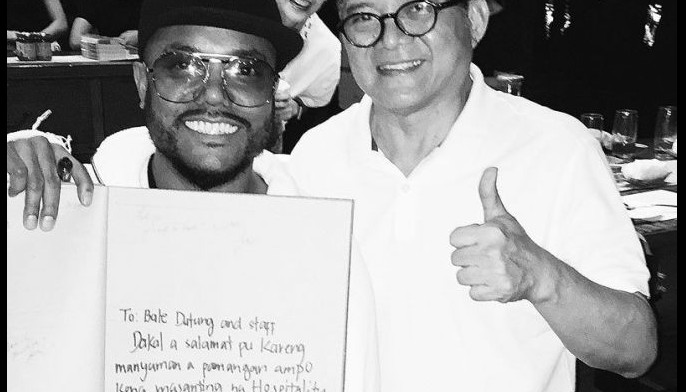Beyond the call of duty: celebrating the humanitarian spirit around the globe
MANILA, Philippines - “The only thing necessary for evil to triumph is for good men to do nothing.” – Edmund Burke
Imagine a world without humanitarians. A world wrought with wars and natural calamities, with so many dying from famine and floods, earthquakes and man-made disasters and no people willing to serve at the cost of their own life and limb to make other people’s lives better than when they found them.
All around the world, in places where people flee from abuse and disaster, humanitarians rush to their aid. In photos depicting massive environmental catastrophes and conflict – from the devastation brought by super typhoon Yolanda to the children cowering in the streets of Gaza, it is hard to miss the comforting profile of the humanitarian – often wearing a vest, handing out relief goods, lending an ear and a warm hug. More than offering life-saving essentials, they give what survivors need most – to know that someone cares about them.
Considered by many as one of the noblest professions, the life of the humanitarian worker, however, comes at a tremendous – often even painful – personal cost.
World Vision, an international Christian humanitarian advocacy and relief organization has been responding to most of the world’s massive disasters in the past five decades. Many are the tales of hope and triumph amidst the backdrop of hopelessness, witnessed by World Vision aid workers, but more still are the stories of hardships and risks faced by these modern-day heroes in the course of their work – which often times go well beyond the call of duty.
John Schenk, a Wold Vision communications manager in the US, was among the first journalists and aid workers to respond to the Rwandan Genocide in 1994. Considered to be one of the world’s worst massacres, the brutal murders left an estimated 1-million Rwandans dead, eradicating 20 percent of the country’s total population.
As the rest of the world watched in horror in the comforts of their homes, Schenk personally witnessed the atrocities, with a ready video cam in hand and a gruesome tale to tell.
While he was successful at helping break the story to the world, Schenk paid a personal price – he suffered from post-traumatic stress disorder (PTSD) and had to leave Africa to receive counselling.
The case of PTSD among aid workers has become an alarming statistic – revealing that the carer needs just as much caring as the survivors they attend to. In a previous study published in 2001 in the ‘Journal of Traumatic Stress’ revealed that 30 percent of returning relief workers exhibited symptoms of stress that can be attributed to PTSD.
In the case of aid workers who operate mostly in harsh environments, traumatic events may be caused by witnessing a massive disaster, seeing and handling dead bodies, the risk of getting killed, or witnessing children die gradually from starvation or disease. The hard life of responding to emergencies often leaves an indelible emotional and physical toll on them. They are subjected to the same diseases they seek to treat, and perish from the same catastrophes they advocate to prevent.
“Sometimes, I had to go to a corner to catch my breath and fight away tears. There’s no getting used to sharing tales of destruction, of seeing children and families suffer. Relief workers are not insulated from the difficulties of our people – we feel their hunger and thirst, their pain and loss,” shares World Vision Emergency Communications Specialist Aaron Aspi who has recently responded to two unprecedented disasters, only two weeks apart – the earthquake in Bohol and typhoon Yolanda in Leyte.
He relishes some of his experiences while reporting in the aftermath of typhoon Yolanda:
“Hearing my teammates snore as they slept was a welcome disturbance. To me, it meant that we have won again another hard-fought day in the field, doing assessments and relief distributions.”
Why is it then that humanitarians persist in their work despite the apparent risks and hardships?
Despite the daunting task, Aspi shares the “unspeakable” joy he feels every time he is able to uplift the conditions of the survivors with any form of help he could give:
“Every relief pack we distribute means one less worry item for the thousands who were displaced. To me, it meant hungry children won’t have to beg in the streets and work in peril to help their families. Since we distribute enough to last them for two weeks, it meant that at least for that period of time, they won’t have to worry about what to eat or drink. I also know how important it is for someone who has lost his home to have a decent mat and blanket to sleep in. It is imperative that we make them feel that even if they’re survivors, their dignity is still of utmost value to us,” says Aspi.
Hoping to reflect the love of God to others, Aspi says his faith inspires him and dreams that one day, the survivors would get back on their feet and rebuild their communities even better than before.
For veteran relief worker-communicator Cecil Laguardia, the joy of being a humanitarian is “indescribable”, despite of the risks involved.
“For a communicator like me, linking the disaster survivors to the world and giving them voice is a privilege – writing their stories, sharing their plight, and encouraging people globally to help. Every day, I wake up inspired knowing that I have a special assignment waiting to be done, “Laguardia shares.
In her 14-year stint as communicator for World Vision’s Philippine office, Laguardia was able to cover more than 20 countries and reported global disasters, including the Asia Tsunami in 2004, drought in the Horn of Africa, and typhoon Yolanda. A veteran not only in disaster, but also in crisis, response she was also previously deployed to respond in the Thailand tsunami, the Mindanao conflict in 2004, and the Timor Leste Crisis in 2006.
For his part, Schenk still believes in the important role he plays as a communicator by giving a “voice” to those who could not speak about their ordeal:
“One sees the unimaginable, the nearly indescribable in responding to a disaster. The earlier you arrive, the worst the sights, sounds and smells taken in. But none of it compares to the experiences of men, women and children who lived through the earthquake, the flood and the shelling that brought you there. As a communicator, I help share their story to the world,” he wrote in an article.
“Listening can be a powerful act of kindness,” adds Schenk.
Meanwhile, World Vision field communicator Crislyn Felisilda, being a relief worker is a “calling”.
“Being in actual emergency scenario could add psychological and emotional stress because whether I like it or not, it would definitely affect me personally. Your safety is at risks—all the time. But, this job motivates me to genuinely help. For me, being a humanitarian and development worker is a calling – not just a job. Sometimes, there seems be no sharp distinction between work and life, between my interests, passion, and job description. There is an upside to a work that you are passionate about, not simply doing it because you are getting paid for it.”
Felisilda and other World Vision responders almost died in a freak car accident while responding to typhoon Megi in Isabella in 2010. The incident left Felisilda traumatized, and until this day four years after, still struggle whenever she travels by car.
Being away for long durations during deployment also brings strains in relationships, shares Felisilda.
“The unpredictable trips, the pace of work, separation from loved ones, and other stressors can be difficult factors to sustain a good relationship. However, open communication is still the answer. During relief efforts, I talk to my family, friends and love ones regarding what I’ve been up to. I tell them what I see, what I experience, and what I hear from the stories of affected children and families. Even though they’re not physically present with me, they become part of what I do and they seem to understand more what may be going on. They pray for me and support me every step of the way. My loved ones give me more energy and inspiration to do better. I’m forever thankful they understand.”
Despite almost losing her life to her chosen profession, Felisilda calls it the “best job in the world”.
“It’s interesting, challenging, exhilarating, and fulfilling. In my humble way, I believe I contribute in making children and families to live better. That’s tremendously powerful and motivating, and it’s what keeps me doing this. This kind of work is unique and does not happen every day.”
World Humanitarian Day is celebrated to recognize the many unsung names and faces of many of the world’s selfless humanitarians who work in difficult, often hazardous, contexts in order to translate the vision of world peace, security and equality into real results on the ground.
It is also fitting to remember that it is during one of the bleakest moments of our nation’s history, that the spirit of humanity shone its brightest.
- Latest



























